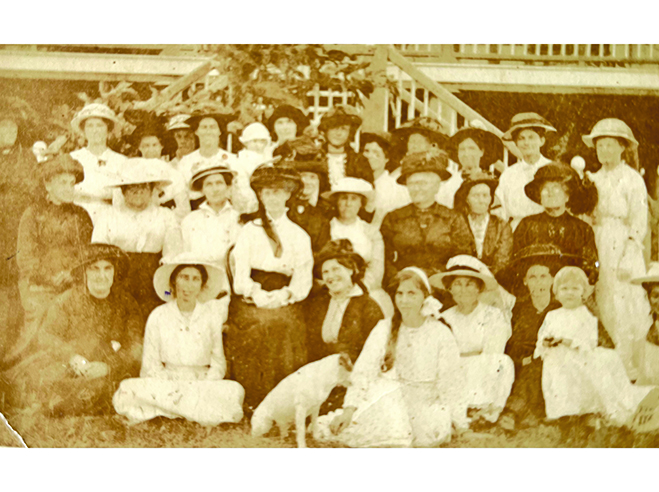

In 1917, when Walter Perroux assembled a composite photograph of Proserpine Pioneers not a single woman featured. Proserpine was a male dominated area. There were approximately four men to every three women, the Shire Council was entirely male as was the Hospital Committee. There were no female professionals such as doctors, dentists and solicitors.
Yet our district can boast of a tradition of wonderful women who, from its earliest time, played a major role in the development of the shire, not only in their traditional roles as wives and mothers but as active, essential members of the farming and business communities. Women such as these…
Mrs Mabel Brown came to Strathdickie in 1905, working as a domestic to help the family finances. On marriage, she not only raised seven children but fostered the daughter of her widowed brother and played an active role in establishing her husband’s cane farm.
Mrs Phoebe Wilson, née Compton, was one of four girls and a boy who all took part in planting, cutting and loading cane. These girls were also being vigorously trained by their mother in general housekeeping skills. In spite of their large families, endless work and isolation, these women did their best to educate their children.
In these early days, Proserpine ladies were good managers, combining their demanding home duties with various social activities such as church groups, working for the hospital sewing group, the Red Cross and the Ambulance Association.
Mrs Sarah Compton, wife of the first Shire Chairman, encouraged a group of ladies, including Mesdames Bode, Sterry, Hinschen and Boxall, to display their preserves and craft work leading to the establishment of the Proserpine (now Whitsunday) Show.
But eldest daughters were still expected to stay home and help and there was little opportunity to work outside the home except for domestic service. To become a nurse or a teacher, training was not available in the town and few families could afford to send their daughters away. Clerical work was mainly a male occupation.
For older single women and widows, life could be hard but many of the women of early Proserpine showed considerable enterprise using their skills to open refreshment rooms such as those of M Isbell and Mrs Furminger in Main St. Others provided accommodation such as Miss Amy Bode’s private boarding house. In an advertisement on April 15th, 1911, Mrs G Taylor announced that she intended holding “A series of Assemblies in the Oddfellows Hall … every fortnight …Bright and up-to-date music.” Others offered dressmaking, tailoring, alterations, repairs and millinery services. The more artistic taught music, painting and fancywork. Mrs McCartney, a widow, was a familiar sight in the 1920s, crossing the river in all-weather to give music lessons.
Some took on more professional roles. The local nursing home “Leumeah” was owned and run by Sister EM Frazer. Others offered home nursing or worked as midwives. Female teachers were mainly from outside the shire but frequently married locally and made valuable contributions to the community.
When the first Proserpine Post and Telegraph Office was opened, it was administered by Mrs Maggie Tracey. When the owner and publisher of “The Proserpine Guardian” died in 1915 his widow, Mrs Scott, took over the business. She managed it successfully until handing it over to her son in 1928.
These are just a very few of the district’s prominent women whose skills, courage and determination have enriched our community.
Story and photo courtesy Proserpine Historical Museum
A group of prominent Proserpine Ladies 1917